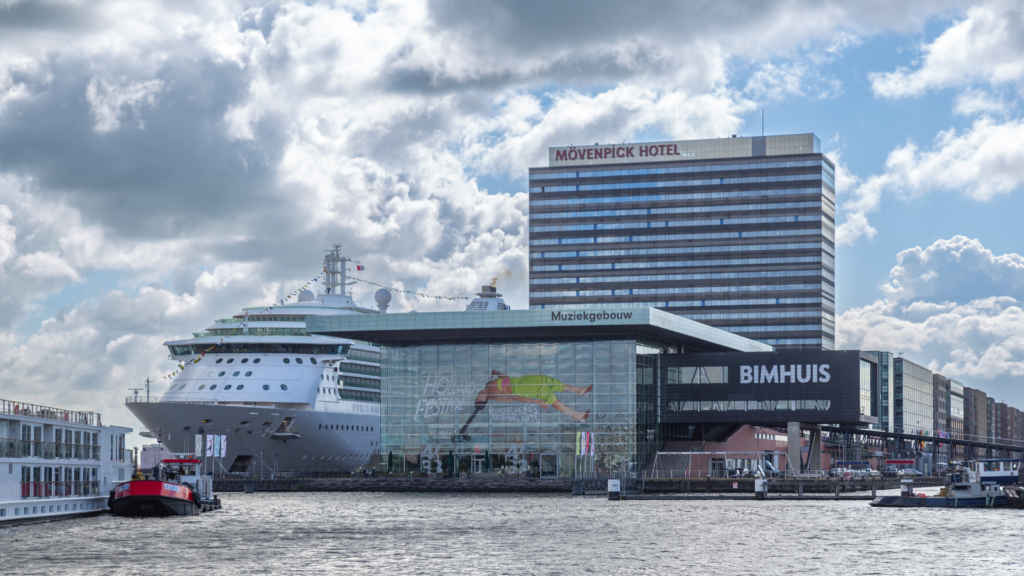Ambassador Cruise Line recently adjusted its itinerary due to planned protests by Extinction Rebellion. The cruise ship Ambience was originally scheduled to dock in Amsterdam but was redirected to Ijmuiden.
This decision, influenced by recommendations from local port agents, emphasises the cruise line’s commitment to guest safety and operational smoothness amidst environmental activism.
Circumventing Disruptions for Safety
Ambassador Cruise Line was compelled to alter its scheduled route due to anticipated protests by Extinction Rebellion in Amsterdam. Initially expected to dock at the city’s main port, the Ambience vessel was redirected to Ijmuiden, a location approximately one hour away from Amsterdam. This strategic decision was made in response to potential disruptions, ensuring the safety and comfort of all onboard.
Guest Accommodations Ensured
In light of this unexpected change, Ambassador Cruise Line has implemented several measures to accommodate its guests. Complimentary transfers to Amsterdam have been arranged, allowing passengers to continue enjoying their planned excursions. According to a statement by the cruise line, destination experiences will proceed as scheduled, albeit with extended durations to account for travel time.
Implications of Protest Movements
The anticipated protest by Extinction Rebellion highlights broader issues concerning environmental activism and its impact on commercial activities. Such demonstrations aim to raise awareness about environmental degradation and advocate for strong policy actions. The Amsterdam City Council’s decision to relocate its cruise terminal by 2035 further underscores the growing tension between tourism and sustainability.
The implications for the cruise industry are considerable, as ports worldwide grapple with similar challenges. The balance between facilitating tourism and addressing environmental concerns is a delicate one, calling for strategic adaptation by cruise operators to minimise disruptions while maintaining service quality.
It is noteworthy that Amsterdam plans to significantly reduce the number of ships allowed to dock in the city. This is a proactive step towards mitigating the effects of over-tourism, a move aligned with global sustainability efforts. The policy shift reflects a growing trend among cities to regulate tourism in favour of preserving local environments and communities.
Industry Response to Activism
The cruise industry’s response to activism and regulatory changes is critical. Industry leaders are increasingly aware of the necessity to adapt to evolving environmental standards. Ambassador Cruise Line’s swift response to the Extinction Rebellion protest exemplifies proactive management in the face of potential operational challenges.
By swiftly redirecting the Ambience vessel, Ambassador showcased a commitment to both safety and passenger satisfaction. Such swift adaptations are crucial in maintaining operational continuity while facing external pressures, demonstrating the industry’s capacity for resilience and customer focus.
Cruise Line’s Strategic Adjustments
The adjustments made by Ambassador Cruise Line were communicated clearly to passengers and stakeholders. This transparency is key to maintaining trust and confidence among travellers and partners. The company’s decision involved coordinated efforts with local port authorities to ensure that passengers could still enjoy their planned activities despite the change in docking location.
Ambassador Cruise Line’s strategy included thanking passengers and partners for their understanding and support, highlighting the importance of collaboration in overcoming logistical hurdles. These efforts reflect a broader trend within the industry to foster positive relationships even amidst changes.
Future Outlook for the Cruise Industry
The incident involving Ambassador Cruise Line highlights broader industry challenges as external factors increasingly influence operational decisions. The need for adaptability in the face of environmental activism and regulatory changes will likely shape the future strategies of cruise operators.
This shift towards environmentally considerate operations is being embraced as an opportunity for innovation. The cruise industry is exploring various avenues to enhance sustainability, ensuring that future travel demand is met responsibly. Collaboration with environmental groups and regulatory bodies will be essential in this transformative journey.
Conclusion and Reflection
The redirection of Ambassador’s Ambience vessel serves as a poignant reminder of the ongoing need for strategic foresight in the cruise industry. As the sector continues to navigate complex environmental and regulatory landscapes, adaptability remains a cornerstone of operational success.
This scenario highlights the increasing pressures on the cruise industry to balance operational efficiency with environmental responsibility.
As regulations tighten and activism grows, companies like Ambassador must remain agile, ensuring both customer satisfaction and sustainable practices.

